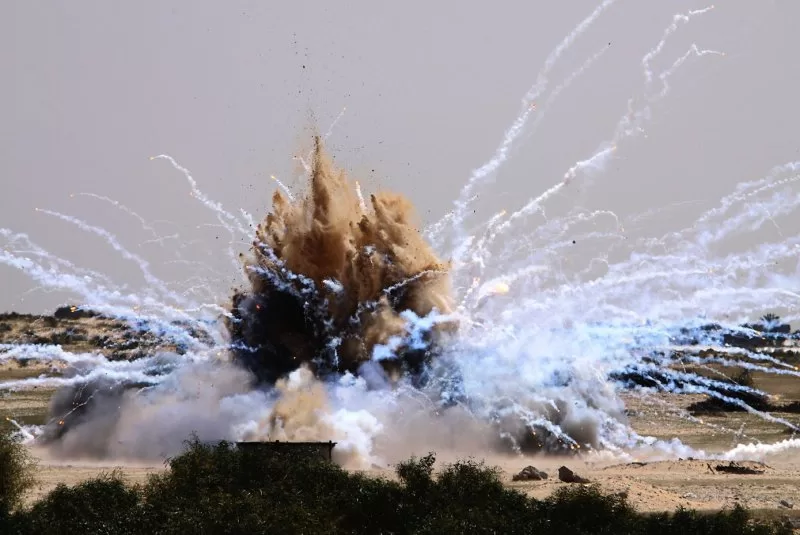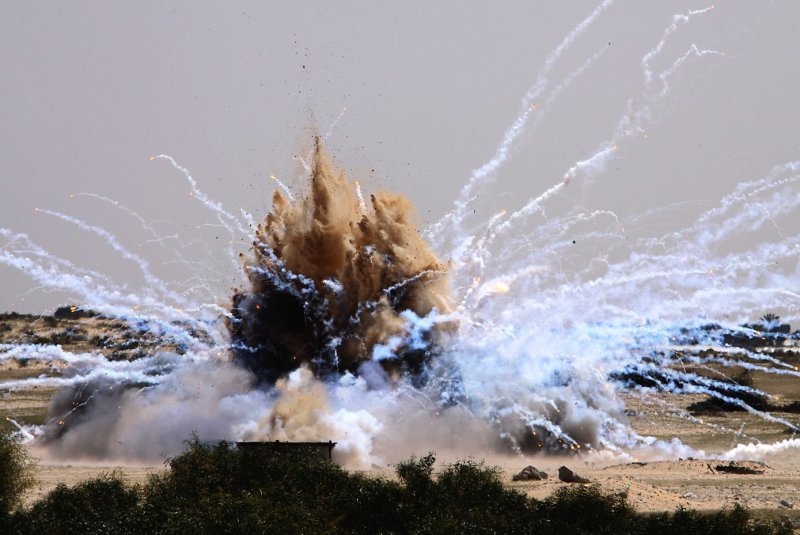White phosphorous munitions are blown up by UN and Hamas sappers in Rafah in the southern Gaza Strip in March 2010. File Photo by Mohammed Saber/EPA
Nov. 10 (UPI) — Loopholes in international laws governing the use of incendiary weapons are allegedly allowing warring parties in Ukraine and the Middle East to exploit the use of such weapons without adequately protecting civilians.
Human Rights Watch released a new report Thursday tracking the use of controversial weapons in Ukraine and the Middle East, claiming that warring factions are abusing Protocol III to the Convention on Conventional Weapons.
Parties to conflicts that are allegedly using incendiary weapons include Israel, Russia and the Ukraine — as well as the government of Bashar Al-Assad, the president of Syria, who is accused of using them against his own people in an ongoing and multi-fronted civil war.
“Protocol III … governs these weapons, but it has failed to adequately protect civilians due to two loopholes. First, its definition excludes multipurpose munitions, notably white phosphorus, that are not ‘primarily designed’ to set fires and burn people,” the report reads.
“Second, the protocol has weaker regulations for ground-launched than air-dropped incendiary weapons, perhaps reflecting concerns that existed during the negotiations of Protocol III 40 years ago but are not relevant to contemporary practice.”
HRW has tracked the repeated use of white phosphorous by the Israeli military in Lebanon and in Gaza since the war began in October 2023. Israel is not a high-contracting party to the CCW.
In statements to the media, Israel has noted that its white phosphorus shells “are used by the IDF for creating smokescreens and not for targeting or causing fires and are not defined under law as incendiary weapons.”
Meanwhile, in Ukraine, HRW has tracked at least 157 attacks in Ukraine using surface-fired incendiary weapons between February 2022 and August 2024.
HRW said it has not been possible to attribute responsibility for these attacks to either Ukraine or Russia but both countries possess the type of rockets that can fire such weapons. Both countries have allegedly developed and used armed drones “to deliver incendiary munitions on the battlefield.”
In November 2023, high contracting parties of the CCW met as more countries began to express concern about the use of incendiary weapons and called for action.
“The reliance of CCW meetings on consensus-based decision-making, however, meant that the adoption of these states’ proposals was blocked,” HRW charged in its report.
But another meeting of high contracting parties of the CCW will be held this week, and HRW is urging member states to express their support for strengthening the law and closing the loopholes in it to “further stigmatize the use of incendiary weapons.”
“Incendiary weapons are notorious for their horrific human cost. They contain different chemical compounds, such as napalm or thermite, that ignite and inflict short and long-term harm,” the report reads.
“Those who survive the immediate harm face a lifetime of physical and psychological scars.”

